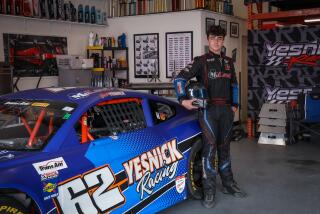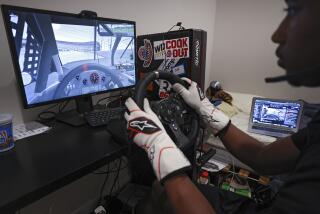High Life / A WEEKLY FORUM FOR HIGH SCHOOL STUDENTS : He’s on a Merry Go-Cart Go-Round : Hobbies: Robert Crosby, a student at Troy High School in Fullerton, has won 70 trophies and a tidy $4,000 in prizes for his driving skills.
- Share via
YORBA LINDA — Most teen-agers, not to mention many adults, can only dream about speeding in their cars without getting a ticket.
But Robert Crosby, who has just finished his junior year at Troy High School in Fullerton, has been rewarded for just such driving ever since he was 10 years old.
Crosby, 17, is a go-cart racer, and a successful one at that. He has won more than 70 trophies--and, he estimates, about $4,000--for his driving skills. Just last year, he took second place in the Pro American Shift Sports competition series of races.
His interest in motor sports came about shortly after his father, John Crosby, noticed a go-cart being advertised in the window of a local motorcycle shop. As a boy in Pico Rivera, John had some experience with go-cart racing.
“(Go-carts) rekindled a sense of excitement in me that I hadn’t felt for a number of years,” John said. “(Robert) was at the age that I wanted to find something we could do together as father and son.”
John decided to take in a drag race to see if Robert shared his father’s enthusiasm for cars.
“The cars had so much horsepower,” Robert recalled. “The smells and the sounds were amazing.”
Today’s go-carts, which have evolved quite a bit, according to John, consist of a chassis and a 125-cc motorcycle engine. A production model can cost upwards of $7,000, so Crosby and his father, who is an electrical engineer, decided to take a few months to build their own at their house in Yorba Linda.
Crosby said they still work on their go-cart nearly every day, calling themselves “privateers” because they do so--and race--without the monetary help of sponsors.
“We don’t have sponsors now mainly because it’s not necessary in go-cart racing,” he said. “My dad is a tinkerer and likes to work on his own things, but we both understand that later on we’ll need sponsorship at the next level.”
Go-carts can reach speeds of 110 m.p.h., but Crosby says it’s unusual to exceed 85 m.p.h. in race conditions. A typical race is 1 1/2 miles in distance, involving 15 to 25 go-carts on a track that’s nearly a mile in length and wide enough to fit three carts side-by side.
Crosby either practices or races most every weekend on tracks in Riverside, Oxnard, San Diego or Bakersfield.
Races are usually held every other Sunday.
“Every race is different,” Crosby said. “You learn something new each time you go out.”
Crosby said he thrives on the intensity and pressure of a race, relying on his impulses to react to any given situation.
“(In a race,) you’re concentrating so much, you really don’t have time to think,” he said. “Most of it is instincts you build up over the years.”
Two summers ago, Crosby attended a four-day course at the Paul Ricard Racing School in France, where his family had taken its vacation to see the 24 Hours of LeMans road race.
“It was actually pretty stressful,” Crosby said of the classes. “At 15, I was the youngest to ever go there. I learned a lot, but it was pretty intense. I didn’t even know how to use a manual shifter (before attending the classes).”
Crosby plans to apply the knowledge he’s acquired from go-cart racing to a career in professional Indy cars or Formula One racing.
His father believes that goal to be a realistic one.
“If you want a biased opinion,” John Crosby said, “I think he certainly has the technical skills to advance (in pro racing).”
Crosby is a dedicated driver who thoroughly enjoys his sport.
“(Racing) makes me feel good because it’s something I have a talent for,” he said. “Everyone has something they’re good at, like baseball or basketball, but this is my specialty. It’s unique.”






